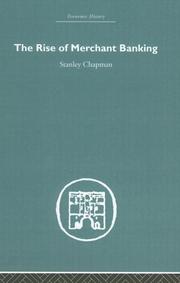| Listing 1 - 4 of 4 |
Sort by
|

ISBN: 1135032459 0203709497 1299287131 1135032467 0415489482 041537863X 9781135032463 9780415378635 0415378508 9780415378505 0415286190 9780415286190 9780203709498 9781135032449 1135032440 9781135032456 9780415489485 0043320945 9780043320945 Year: 2006 Publisher: London New York Routledge
Abstract | Keywords | Export | Availability | Bookmark
 Loading...
Loading...Choose an application
- Reference Manager
- EndNote
- RefWorks (Direct export to RefWorks)
This is the first serious history of merchant banking, based on the archives of the leading houses and the records of their activities throughout the world. It combines scholarly insight with readability, and offers a totally new assessment of the origins of one of the most dynamic sectors of the City of London money market, of the British economy as a whole and of a major aspect of the growth of international business.Dr Chapman has researched new material from the archives of Rothschilds, Barings, Kleinwort Benson and other leading houses together with a wide range of archiv
Merchant banks --- Acceptance houses (Banking) --- Accepting houses (Banking) --- Banks and banking --- Acceptances --- History. --- History --- Private finance --- History of the United Kingdom and Ireland --- anno 1800-1999 --- Merchant banks - History --- 331.162.22 --- 333.101 --- 333.132 --- GB / United Kingdom - Verenigd Koninkrijk - Royaume Uni --- Geschiedenis van de private banken --- Banksysteem en bankstelsel --- Investeringsbanken, depositobanken, gemengde banken
Book
ISBN: 0674073037 0674075579 9780674075573 9780674073036 Year: 2013 Publisher: Cambridge, MA
Abstract | Keywords | Export | Availability | Bookmark
 Loading...
Loading...Choose an application
- Reference Manager
- EndNote
- RefWorks (Direct export to RefWorks)
Gentlemen Bankers investigates the social and economic circles of one of America's most renowned and influential financiers to uncover how the Morgan family's power and prestige stemmed from its unique position within a network of local and international relationships. At the turn of the twentieth century, private banking was a personal enterprise in which business relationships were a statement of identity and reputation. In an era when ethnic and religious differences were pronounced and anti-Semitism was prevalent, Anglo-American and German-Jewish elite bankers lived in their respective cordoned communities, seldom interacting with one another outside the business realm. Ironically, the tacit agreement to maintain separate social spheres made it easier to cooperate in purely financial matters on Wall Street. But as Susie Pak demonstrates, the Morgans' exceptional relationship with the German-Jewish investment bank Kuhn, Loeb & Co., their strongest competitor and also an important collaborator, was entangled in ways that went far beyond the pursuit of mutual profitability. Delving into the archives of many Morgan partners and legacies, Gentlemen Bankers draws on never-before published letters and testimony to tell a closely focused story of how economic and political interests intersected with personal rivalries and friendships among the Wall Street aristocracy during the first half of the twentieth century.
Bankers --- Banks and banking --- History. --- Morgan, J. Pierpont --- Morgan, John Pierpont, --- Morgan, Pierpont, --- Morgan, J. P. --- J.P. Morgan & Co. --- Morgan (J. P.) and Company --- J.P. Morgan and Co. --- JP Morgan (Firm) --- J.P. Morgan (Firm) --- JPMorgan (Firm) --- Morgan & Co. --- Drexel, Morgan & Co. --- Guaranty Trust Company of New York --- Morgan Guaranty Trust Company of New York --- J.P. Morgan Chase & Co. --- History --- J.P. Morgan & Co --- E-books --- 331.162.22 --- 331.19 --- US / United States of America - USA - Verenigde Staten - Etats Unis --- Geschiedenis van de private banken --- Geschiedkundige en andere inlichtingen over industriële, financiële en handelsondernemingen
Book
ISBN: 3830526512 9783830526513 9783830518693 3830518692 9789400002203 9400002203 Year: 2011 Publisher: Mortsel Intersentia
Abstract | Keywords | Export | Availability | Bookmark
 Loading...
Loading...Choose an application
- Reference Manager
- EndNote
- RefWorks (Direct export to RefWorks)
Great financial disasters are not a new phenomenon. Probably the first well documented financial disaster was the so-called Tulipmania in the Netherlands in the 1630s, some 300 years before the Wall Street crash. At the end of the twentieth century a similar phenomenon occurred. This time it has taken the form of shares in companies trading on the Internet (i.e. new technology), the so-called dotcom companies. These events had one thing in common; they were spawned by the new technology of the time and fed by that one great human failing - the triumph of hope over reality, which some people wo
Financial crises. --- Business cycles. --- Economic cycles --- Economic fluctuations --- Cycles --- Crashes, Financial --- Crises, Financial --- Financial crashes --- Financial panics --- Panics (Finance) --- Stock exchange crashes --- Stock market panics --- Crises --- Financial crises --- Bank failures --- -Stock exchanges --- AA / International- internationaal --- 333.17 --- 333.139.2 --- 331.162.22 --- 331.19 --- 332 --- Bulls and bears --- Commercial corners --- Corners, Commercial --- Equity markets --- Exchanges, Securities --- Exchanges, Stock --- Securities exchanges --- Stock-exchange --- Stock markets --- Capital market --- Efficient market theory --- Speculation --- Failure of banks --- Business failures --- History --- Crises, saneringen en hervormingen van het bankwezen --- Bankcontrole en -reglementering. Reglementering van het bankberoep --- Geschiedenis van de private banken --- Geschiedkundige en andere inlichtingen over industriële, financiële en handelsondernemingen

ISBN: 0521803292 0511012187 0521027306 0511047959 0511511876 0511152701 0511119550 1280159456 0511302134 1107123259 Year: 2001 Publisher: Oxford, UK ; New York : Cambridge University Press,
Abstract | Keywords | Export | Availability | Bookmark
 Loading...
Loading...Choose an application
- Reference Manager
- EndNote
- RefWorks (Direct export to RefWorks)
The Deutsche Bank, Germany's largest financial institution, played an important role in the expropriation of Jewish-owned enterprises during the Nazi dictatorship, both in the existing territories of Germany, and in the area seized by the German army during World War II. In this 2001 book Harold James uses new and previously unavailable materials, many from the bank's own archives, to examine policies which led to the eventual genocide of European Jews. How far did the realization of the vicious and destructive Nazi ideology depend on the acquiescence, the complicity, and the cupidity of existing economic institutions, and individuals? In response to the traditional view that business co-operation with the Nazi regime was motivated by profit, this book closely examines the behaviour of the bank and its individuals to suggest other motivations. No comparable study exists of a single company's involvement in the economic persecution of the Jews in Nazi Germany.
World War, 1939-1945 --- Banks and banking --- 2ème guerre mondiale --- Banques --- Economic aspects --- Jews --- History --- Aspect économique --- Juifs --- Histoire --- Deutsche Bank (1957- ) --- Political activity --- Arts and Humanities --- DE / Germany - Duitsland - Allemagne --- 331.162.22 --- 335 --- -World War, 1939-1945 --- -940.531 --- European War, 1939-1945 --- Second World War, 1939-1945 --- World War 2, 1939-1945 --- World War II, 1939-1945 --- World War Two, 1939-1945 --- WW II (World War, 1939-1945) --- WWII (World War, 1939-1945) --- History, Modern --- Geschiedenis van de private banken. --- Economie van conflicten en van verdediging. Oorlog. Terrorisme. Economisch herstel. --- -Jews --- -Deutsche Bank (1957- ) --- Political activity. --- World War, 1939-1945 - Economic aspects - Germany. --- World War, 1939-1945. --- Finance --- Business & Economics --- Banking --- Deutsche Bank --- 2ème guerre mondiale --- Aspect économique --- Deutsche Bank Aktiengesellschaft --- Doĭche Bank --- Norddeutsche Bank --- Deutsche Bank und Disconto-Gesellschaft --- Rheinisch-Westfälische Bank --- Süddeutsche Bank --- Hessische Bank --- Bayerische Creditbank --- Südwestbank (Germany) --- Disconto Bank --- Berliner Disconto Bank --- 940.531 --- Geschiedenis van de private banken --- Economie van conflicten en van verdediging. Oorlog. Terrorisme. Economisch herstel
| Listing 1 - 4 of 4 |
Sort by
|

 Search
Search Feedback
Feedback About UniCat
About UniCat  Help
Help News
News